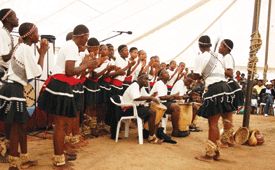Domboshaba festival repeats call for Ikalanga in schools
EDWARD BULE
Correspondent
| Wednesday October 6, 2010 00:00


When presenting a report to the gathering, the chairperson of the Domboshaba Cultural Trust, Kangan'gwani Phatshwane, read to the attentive gathering a written response from the Botswana government to a letter by Bakalanga in 2009 at Domboshaba.
The Bakalanga had demanded that the government re-introduce the teaching of Ikalanga in schools. The teaching of Ikalanga was discontinued in 1972.
Government's refusal by letter, was read to the gathering. Government's position is that the financial implications of introducing Ikalanga are prohibitive.
It is also government's position that if it acceded to the demand to introduce Ikalanga into the curriculum, the other tribal groups would demand that the same right be extended to them; something which government does not have the capacity to achieve, according to the letter.
In the same letter however, the government pledged support to cultural groups in order to empower them to realise their aims and objectives. When asked to suggest the way forward, various speakers expressed disappointment at the negative response from the government regarding their desire to have their language taught at school.
One speaker, accusing the government of taking Bakalanga for granted, shouted, 'Enough is enough'. Another speaker, a former political activist, called upon Bakalanga not to relent but to demand what rightly belongs to them.
He advised Bakalanga to align themselves with organisations which are sympathetic to their cause, likening the struggle of the Bakalanga for cultural recognition to that of the workers who expended a lot of energy and resources to achieve Labour Day.
The government's reasoning that financial constraints stood in the way of cultural diversity was scorned upon by a speaker who insisted that democracy is expensive.
One speaker even suggested the possibility of government allowing Bakalanga educationists to use public schools to render their teaching services free of charge as a way of advancing the language at no expense to government.
Another speaker called for the formation of pressure groups. Yet another speaker blamed the Bakalanga for oppressing themselves by neglecting to speak their language in public. He wants the Bakalanga to make their presence felt by speaking their language in public as well as giving their offspring Ikalanga names. The people were also called upon to call their villages, rivers and other features by their Ikalanga names. Another contributor advised the listeners to vote a party and candidate whose position on the teaching of Ikalanga is clear and favourable.
Making Setswana an optional subject was also mentioned as a possible way forward. One speaker felt that if Setswana is changed from a compulsory to an optional language, less money would be used on it because the number of Setswana students will drop. This would allow the government to use the difference to develop the other languages.
Meanwhile, recognising the fact that Dikgosi have got a duty in ensuring that their people do not abandon their culture, Kgosi Mpilo Tshupoeng of Kalakamati said in an interview that she is worried that only two languages are recognised as official in Botswana. She would be comfortable with an arrangement where all the languages in the country are recognised as official.
She said that at her kgotla - ukhota in Ikalanga - the people are encouraged to communicate in the language of their choice. She said that it is up to Bakalanga to re-instate their language by speaking it.
Kgosi Thabo Maruje III of Masunga said in an interview that he and his people are considering the introduction of an annual culture day in his area of jurisdiction where the people will have the opportunity to take stock of the status of their language and culture.
